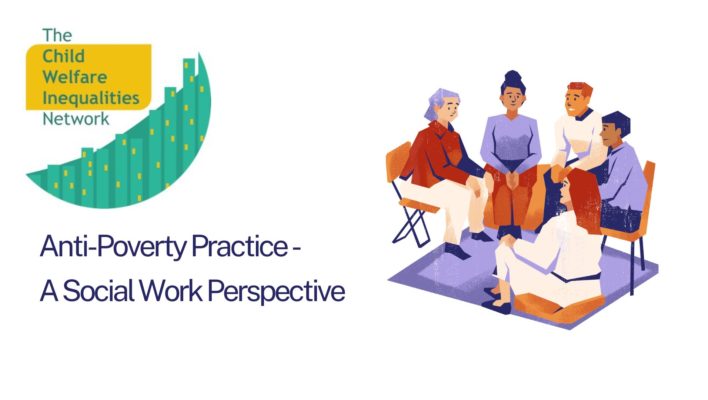Anti-Poverty Practice – A Social Work Perspective

On 5 October, a seminar organised by the Child Welfare Inequalities Network took place. The Child Welfare Inequalities Network launched in September in Brighton, it is an international network of colleagues, academics and practitioners from a range of countries who are trying to understand, as well as transform, the ways in which children’s lives are impacted by inequalities and imperatively the interactions between the welfare services and child protection services.
The main speakers were, Susan Pierce, a social worker and Brighton and Hove Lead Practitioner for the Partners in Change Hub in Children’s Services focussing on anti-poverty practice and Chrissy Bulling, a social worker and East Sussex Practice Development Lead for Connected Practice focussing on trauma informed working, family participation and anti-poverty practice.
The centre of the conversation was how their two local authorities developed an anti-poverty practice and how this work intersects with their relationship based and trauma informed practices. Susan explained that “using an antipoverty lens to work alongside families is not an add on, nor can it be used in isolation of the other tools social workers use, rather, it as a framework to support social workers to think about how the daily lived experiences of children and their parents or carers is impacted by poverty.”
Working through an anti-poverty lens
The floor of discussion was opened by shedding light on the importance of language and interpreting the definition of poverty. To do so they spent time with families and children social care staff to think about what poverty means to them. This enabled appropriate language to be utilised across Pan Sussex. Chrissy mentioned the parallel between that process and the Understanding Poverty in All its Forms report, due to its collaborative nature between people with lived experience. They found that there was a repeated telling of feeling inadequate and ashamed, a constant cycle of stress and worry for the future. This method allowed thinking behind what the appropriate ways were to engage with families.
Susan added that “A direct approach can be really hard but working through an anti-poverty lens requires us to sometimes feel uncomfortable and do it anyway, this means it’s vital when making decisions that will affect people’s lives that those with lived experience are listened to and their voices are involved in policy and strategic decision making, whether this is at a national or a local level and that begins with these tricky conversations in someone’s living room.”
Challenges
It is challenging, they unravelled the complexities of using an anti-poverty framework. Social workers witness the impact of poverty on families and feelings of desire to help, while the current government discourse is at odds, is a common dilemma. In the system’s current climate social workers feel they have very limited agency. In return East and West Sussex workers are provided with a reflective space, providing workers with an opportunity to share difficult experiences. These are facilitated by experienced workers who can support and examine what is happening.
Relationship-based practice
Earlier this year they were given some funding to establish an evaluation framework of what relationship based practice means and why it is important for families. This involved 20 parents, 20 children, 20 practitioners and some senior managers. Through this it was discovered that being human is the key to sharing connection and understanding. When thinking about relationship based social work it has to cover a whole perspective of the system, therefore, the work force and the families. Families gave examples of social workers coming to their door stressed, thus, reflective practices and spaces for social workers are very important.
Tools for social workers
Providing practitioners with tools enables wider perception of one’s experience. They make use of the John Burnham Graces model to not only understand intersectional needs of somebody experiencing multiple disadvantages and discriminations but also the strengths of these areas. Religion, for example, harvests a sense of community.
An anti-poverty statement
Last year across Sussex, all three local authorities developed an anti-poverty statement. An awareness raising statement, making everyone involved in the system aware that this is a national problem and not an individual failing. It was important to spread this message to get social workers to contemplate systemic issues and to recognise their potential bias.
Another tool created by the family information service in Brighton and Hove was a cost of living factsheet to support families and a cost of living checklist for workers, this saves time by identifying families’ financial needs and supplying immediate information upon funding, local support groups and resources.
To conclude
At the end Professor Paul Bywaters took on the role of the discussant, asking crucial questions to Susan and Chrissy and to develop audience conversation.
Questions posed included: do social workers who are adopting this anti-poverty approach feel differently and behave differently? What are the barriers that people who want to take poverty seriously face to changing practice? How do we make sure these changes are not new initiatives but are built into the systems and processes in a routine and developing way?
It is evident that the willingness and commitment is there but there is a need for evaluation of how we know this is making a difference to families. The seminar proved that positive progress is taking place in what they recognise to be an ongoing journey towards a better future for families.

